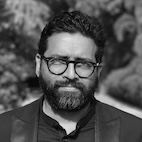
Prayas Abhinav was born in 1982. He practised independently from 1999 to 2005. Then he did an advanced diploma in Experimental Media Arts (EMA) at Srishti School of Art, Design and Technology from 2007 to 2009. From 2010-2013, he was a faculty and artist-in-residence at Srishti. From 2013-2016 he taught numerous courses at National Institute of Design (NID), CEPT University and Indus University. In 2024 he joined Anant University as an Assistant Professor in the Interaction Design department.
He founded a game design studio called Nonserious Games in 2018. It wound up operations in 2022.
He has done numerous public art projects, designed digital and board games, led the Museum of Vestigial Desire from 2012 to 2016 and worked as an artist and curator who showed at The Guild Gallery (Mumbai) from 2011-2013.
His complete CV can be downloaded here, bio from here and portfolio here. Prayas lives with his family in Ahmedabad, India.
Prayas is designing new economic models for different contexts. He is writing a research paper about each model that he designs. He will make his research available here soon. He also intends to design board games for each model to make it easy to access and experience the model's propositions.
The first paper is titled "Decentralised & Federated Art World: A New Economic Model for Creativity and Community" and will be published soon. It describes a new model for the art world.

email, github (my experiments with building web apps), linkedin
Last updated on April 25th, 2025